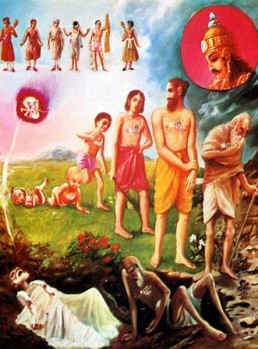Swami Chinmayananda
Swami Chinmayananda Commentary
In Karma Yoga, which the Lord is now explaining, even the highest achievement of Self-realisation is possible because, there, the man works with one resolute determination, with a single-pointed mind. Those who perform actions, labouring under endless desires for results, get their inner personality disintegrated, and with a shattered, thousand-pronged mind, they are not able, consistently, to apply themselves to any line of action; therefore, their endeavours invariably end in disastrous failure.
In this stanza lies the secret of Hindu success — briefly hinted at in hasty words herein. With a single-pointed mind, if an individual can entertain any single resolute-determination and act consistently towards its success, achievement must certainly result. But invariably, man, victimised by his ego, entertains hundreds of desires, often mutually contradictory, and therefore, comes to play upon these fields with an impoverished and exhausted mental strength. This is, psychologically, what we call “self-cancellation of thoughts.” When this comes to plague the mental zone, it exhausts all the potentialities of man and loots away all his chances of success.
Adi Sankara Commentary
Kuru-nandana, O scion of the Kuru dynasty; iha, is this path to Liberation; there is only eka, a single; vyavasayatmika, one-pointed; buddhih, conviction, which has been spoken of in the Yoga of Knowledge and which has the characteristics going to be spoken of in (Karma-) yoga. It is resolute by nature and annuls the numerous branches of the other opposite thoughts, since it originates from the right source of knowledge. [The right source of knowledge, viz the Vedic texts, which are above criticism.] Those again, which are the other buddhayah, thoughts; they are bahu-sakhah, possessed of numerous branches, i.e. possessed of numerous variations. Owing to the influence of their many branches the worldly state becomes endless, limitless, unceasing, ever-growing and extensive. [Endless, because it does not cease till the rixe of full enlightenment; limitless, because the worldly state, which is an effect, springs from an unreal source.] But even the worldly state ceases with the cessation of the infinite branches of thoughts, under the influence of discriminating wisdom arising from the valid source of knowledge. (And those thoughts are) hi, indeed; anantah, innumerable under every branch. Whose thoughts? Avyavasayinam, of the irresolute ones, i.e. of those who are devoid of discriminating wisdom arising from the right source of knowledg.
The Bhagavad Gita with the commentary of Sri Sankaracharya – Translated by Alladi Mahadeva Sastry
Holy Geeta – Commentary by Swami Chinmayananda
The Bhagavad Gita by Eknath Easwaran – Best selling translation of the Bhagavad Gita
The Bhagavad Gita – Translation and Commentary by Swami Sivananda
Bhagavad Gita – Translation and Commentary by Bhaktivedanta Swami Prabupadha
Srimad Bhagavad Gita Chapter 2 – Verse 41 – 2.41 vyavasayatmika – All Bhagavad Gita (Geeta) Verses in Sanskrit, English, Transliteration, Word Meaning, Translation, Audio, Shankara Bhashya, Adi Sankaracharya Commentary and Links to Videos by Swami Chinmayananda and others – 2-41

